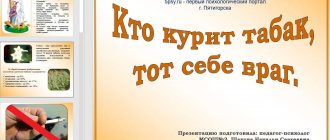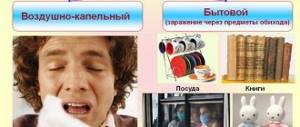Class hour: “Hurray! Holidays! Safe behavior."
Class hour
"Hooray! Holidays! Safe behavior in spring."
Objective of the project:
Provide students with the necessary knowledge, skills and habits of safe behavior on the streets and roads.
Project objectives:
- Expand and deepen students’ knowledge of the rules of behavior on the streets and roads;
- Prove the need to comply with the rules through a game project and other activities;
- Organize “feedback” with students’ families through surveys and conversations at parent-teacher meetings.
Progress of the event.
Teacher's story with presentation
Spring
- Spring has come. It has become warm outside; after a harsh and cold winter, I want to spend more time outdoors. But there are many dangers awaiting us on the street. To avoid disaster, today we will look at how to prevent disaster.
Thin ice
- The bright sun warmed the ice and made it very thin. You cannot go out on the ice, skate, fish on the ice, you cannot cross the river on floating ice floes.
Icicles
- The snow melts on the roofs of houses and huge ice icicles form. You can’t get close to such places; at any moment an icicle can fall right on you. At home, you need to ask your parents to remove the icicles at the entrance, otherwise trouble will come.
Fire
- In the spring, people begin to clean up the area around their houses and light fires. This is strictly prohibited! Never light fires yourself and warn adults not to do this. There is a high risk of fires; the house may catch fire and you yourself may suffer from the fire.
Road
- In spring, active traffic begins. In the village, motorcycles are driven by schoolchildren who do not have a license or driving skills. You need to be especially careful when approaching the road and follow the traffic rules. Playing on the roadway is strictly prohibited.
Bike
- A bicycle is not a toy, but a means of transportation. You can only ride a bicycle on the roadway if you are 14 years old or older. In the meantime, while you are little, you can only ride in a clearing near your house or where there is no traffic.
If you are
in the yard, on the street, at home and in public places
1. Before leaving the apartment (house), look through the peephole and make sure that there are no strangers on the area near the door, otherwise wait.
2.
Never enter an elevator with others (strangers), or into an entrance hall or landing if there are suspicious people standing there.
3. If you are attacked in the elevator, try to press the “Call dispatcher” button, resist, use simple self-defense techniques.
4. When spending time in the yard, stay away from groups of teenagers who are older than you, are under the influence of alcohol or drugs, are gambling, etc.
5. Never get into a car, motorcycle, etc. with strangers.
6. Do not carry valuables or money with you (unless absolutely necessary).
7. Do not climb into basements, attics, or onto the roof.
8. When walking on the street, try to stay close to your home and be in familiar company. The last condition is very important if you go far from home, especially to a foreign area for a dance (disco), market, store, concert, etc. It is imperative that adults know where you are.
9. A call for help is not evidence of cowardice, but a necessary means of self-defense, sometimes salvation.
10. If you are being robbed and there are more attackers and they are clearly stronger, and there is no one nearby who could come to the rescue, then it is better to give the money or thing that they require. Remember that your life and health are most valuable.
11. If they start following you, go (run) to where there are a lot of people, more light (at night), etc.
12. Never gamble, especially for money, with older children or adults, or with strangers in general.
13. For personal safety (prevention of kidnapping), it is necessary:
- try not to be alone, especially on the street, on the way to school and back, from places of leisure;
- change your routes to school, store, friends, etc. more often;
- never talk to strangers, much less suspicious people;
- do not get into other people's cars, do not ride with strangers;
- always inform your relatives about where and when you are going, with whom, how long and where you are going to be, when and in what way you are going to return (if possible, provide your phone number and other coordinates where you can be found).
14. Try to ensure that your route does not go through a forest, park, deserted or unlit places.
15. If you feel like someone is following you, go to the other side of the road, go to a store, to a bus stop, or talk to any adult.
16. If you are delayed somewhere, especially in the dark, call your parents and ask your parents to meet you at the bus stop.
17. If a car slows down near you, move away from it.
18. If you are stopped and asked to show the way, try to explain everything in words without getting into the car.
19. If a stranger introduced himself as a friend of your relatives or parents, do not rush to invite him home, ask him to wait for the adults to arrive outside.
20. If a noisy company comes towards you, cross to the other side of the road and do not enter into conflict with anyone.
21. If strangers pester you and threaten you with violence, shout loudly, attract the attention of passers-by, resist. Your scream is your form of defense!
22.
Remember! For minors, the use of alcoholic beverages, tobacco products, and toxic substances is strictly prohibited and is dangerous to life and health.
23. Remember! It is strictly prohibited for minors to be on the street and in public places after 10 p.m. according to the legislation of the Yamal-Nenets Autonomous Okrug.
24. Remember! For an unlawful act (participation in a fight, committing thefts, etc.) liability is provided in accordance with Russian legislation, incl. Responsibility extends to parents (legal representatives).
25. Be vigilant! Carefully monitor your personal safety and the safety of your belongings (keys, cell phone, pocket money, bag, etc.) and documents, wherever you are.
When you return home, don't let your guard down!
1. If you notice strangers when entering the entrance, wait until one of your friends enters the entrance with you.
2. Don't get into an elevator with a stranger.
3. If you find that the door to your apartment is open, do not rush to enter, go to your neighbors and call home.
If you're home alone
1. Ask your friends and acquaintances to warn you about their visit by phone.
2. If they call at your apartment, do not rush to open the door, first look through the peephole and ask who it is (regardless of whether you are alone at home or with your loved ones).
3. When answering “I”, do not open the door; ask the person to identify himself.
4. If he introduces himself to acquaintances of your relatives, who are not at home at the moment, without opening the door, ask him to come another time and call your parents.
5. If a person calls you a last name, saying that he was given this address without opening the door, explain that he wrote down the address he needed incorrectly, and call your parents.
6. If a stranger introduced himself as an employee of the housing and communal services, post office or other public service institution, ask him to give his last name and reason for coming, then call your parents and follow their instructions.
7. If the person who came introduced himself as an employee of the internal affairs department (police), without opening the door, ask him to come at another time, when his parents will be at home, and inform them.
8. If a stranger asks you to use the phone to call the police or an ambulance, do not rush to open the door; Having specified what needs to be done, call the necessary service yourself.
9. If a company has gathered on the landing, drinking alcohol and interfering with your rest, do not enter into conflict with them, but call the police.
10. When taking out the trash can or going for a newspaper, first look through the peephole to see if there are strangers near your apartment; When you go out, lock the door.
11. Don’t leave a note at the door of your apartment about where you went and for how long. Your home will be your fortress if you take care of your own safety.
Know how to say “NO”
1. When you are asked to commit an unworthy act.
2. When you are offered to try something forbidden.
3. If they offer you to go somewhere, they warn you not to tell anyone about it.
4. When strangers or unfamiliar people invite you to visit them, to a disco, or to a club.
5. When you are offered a “good” rest away from adults and parents.
6. If strangers offer to give you a ride in a car or show them the way while sitting in a car.
7. When you are offered on the street to buy some product at a cheap price, or to play a game of chance, promising a big win.
Remember that in many cases the ability to say “no” is not a manifestation of weakness, but of your own strength, will and dignity.
If there is a fire
1. Do not call from a room where there is already a fire, get out to a safe place with other relatives (help them get out if necessary) and call the “01” service.
2. Don’t stand in a burning room, huddle closer to the floor, where the air is cleaner, and make your way to the exit.
3. Don’t waste time looking for documents and money, don’t take risks, leave the dangerous premises.
4. Never return to a burning room, no matter what reasons prompt you to do so.
5. When leaving burning rooms, close the door behind you, this will reduce the risk of fire spreading.
6.If there are no escape routes, if possible, plug the door cracks with improvised means (any rags, tape, etc.).
7. Stay near the window so that you can be seen from the street.
8. Try not to open other doors in the room so as not to create additional draft.
9. Be patient, don't panic.
10. If there is a fire in the building, do not use the elevator; it may turn off at any minute.
11. When a fire occurs, your main enemy is time. Every second can cost you your life!
Your behavior on the roads and in transport
1. When going out into the street, look first to the left, then to the right, so as not to disturb passers-by.
2. Choose the safest route to school, the one where you have to cross the street or road less often.
3. When you walk along the city streets, be careful. Do not rush. Walk only on the sidewalk or curb.
4. Fewer crossings means fewer dangers.
5. Walk slowly on the right side of the sidewalk.
6. On the side of the road, walk away from the edge of the road.
7. Do not go out onto the roadway or street.
8. When passing the gate, be especially careful: a car may drive out of the gate.
9. Walk carefully past a parked car: passengers can suddenly open the door and hit you.
10. Cross the street only at pedestrian crossings.
11. Before crossing the street, look to the left. If the roadway is clear, go. When you reach the middle of the road, stop. If traffic starts to move, wait at the “safety stop.” Now look to the right. If the roadway is clear, complete the crossing.
12. On a street where there is no pedestrian crossing, you must cross from one corner of the sidewalk to another: it’s safer.
13. If there is a lot of traffic on the street, ask an adult or police officer to help cross it.
14. Wait for transport on the landing pad or sidewalk at the stop sign.
15. When boarding the bus, keep order. Don't disturb other passengers.
16. Enter the bus through the back doors.
17. Exit only through the front doors. Prepare to leave in advance by walking forward.
18. When entering and exiting transport, do not rush or push.
19. Walk around the back of the bus. After getting off the bus, you need to walk along the sidewalk to the pedestrian crossing and only cross it to the other side.
20. When crossing the street, follow the traffic light: Red - STOP
- everyone must stop;
yellow - ATTENTION
- wait for the next signal;
green - GO
- you can cross the street.
21. While in transport, do not walk around the cabin, hold on to the handrail, do not look out of the windows, do not stick out your arms, do not press the emergency buttons unnecessarily.
22. Do not play games on the roadway or near the road. Do not ride bicycles, roller skates, etc. on the roadway.
23. Do not cross the street or road in front of nearby traffic.
24. Don’t cling to passing traffic.
If you find a suspicious (explosive) object
Signs of explosive objects may include:
– an ownerless bag, briefcase, box, package, part, any object found at school, in the entrance, at the door of the apartment, under the stairs, in the car and public transport;
– stretched wire or cord;
– wires or insulating tape hanging from under the machine.
Remember that ordinary household items are used as cover and camouflage for explosive devices: bags, packages, packages, boxes, toys, etc.
In all of the above cases it is necessary:
– do not touch, do not open, do not move the find;
– move to a safe distance;
– report the find to the teacher, parents, or police officer.
When entering the entrance of a house, always pay attention to ownerless items. Don't touch them! Report them to the police!
GBS(K)OU boarding school No. 2
Class hour on the topic:
"Hooray! Vacations! Safe behavior in spring.”
Prepared by:
primary school teacher of the first category
Maydankina Inna Viktorovna
Class hour with presentation, 2nd grade. Spring break
Educational and entertaining hour for 2nd grade “Spring Break”
Author Lyapina Vera Valerievna primary school teacher MBOU School No. 47 Samara City District Description This material is intended for primary school teachers to conduct extra-curricular activities for 2nd grade during spring break. Purpose: Organization of children's leisure time. Objectives -Develop speech, logical thinking, memory, cognitive interest;
— Enrich the child’s experience, saturate this experience with new knowledge; — Work to create a cohesive team of like-minded people, a creative association of children; Progress of the event
Presenter - Good afternoon, guys! The long-awaited days have finally arrived. But guess which ones. These days we rest, we don’t study, we walk. In autumn, winter, spring, you and I have them. And in the summer, I don’t hide it, I take a break from school. I ask you to name the period when I don’t go to school. (children's answers) - Of course, vacations! Do you guys know what vacations are like? (children's answers) -There are school holidays, student holidays, and parliamentary holidays. - Of course, everyone should relax during the holidays. But what are you taking a break from? How do you relax? (Children's answers) But still, in order not to completely forget what you have learned, I suggest briefly repeating some topics in your favorite subjects at school. And at the same time, test your knowledge. Each of you will be a participant in the program. You will receive a point for each correct answer. And at the end of the game we will sum it up and find out the winner. In the first round we will check which of you is strong in mathematics. You need to listen to the task, orally calculate and cross out the answers in the prepared table. Here's a table for everyone. Tasks: 1. 18:6= 2. 6*2+1= 3. 8*4= 4. 4*5= 5. 6*5= 6. 7*5-2= 7. 7:7= 8. 25:5= 9. 3*5= 10. 20:5= 11.7*5= 12.6*5+1= 13.8:4= 14.4*3= 15.16:4= 16.10*3+4= 17.24:4= 18.7* 2= 19.5*5= As a result, from the crossed out numbers in the table we get:
-Well done! Let's move on to the second round. -Let's check.
We did it! Let's move on to the third round.
-You are asked to solve puzzles. The answers will be words with a double consonant. Let's test your knowledge of the Russian language. Answers: (junat, mass, group, column, reins, group) - Let’s move on to the fourth round. Here you need to show your knowledge of the world around you. Answers: May, March, April. And we dealt with it. Well done! Final tour of literature.
Answers:
- Now let's sum it up. The reward awaits the winner. Cinema tickets for winners. Enjoy your holiday. See you after the holidays!
Presentation on the topic: Spring Break
We recommend watching:
Extracurricular activity on the topic: Spring, 4th grade Class hour game for elementary school children on the topic: Spring Conversation for elementary school children. Spring flowers Extracurricular activity for elementary school children on the theme: Spring
Similar articles:
Extracurricular activity in elementary school on the topic: Spring
Extracurricular event on the topic: Spring, 1st grade
Extracurricular activity “Spring has come”, 1st grade
Extracurricular event “Birch - a symbol of Russia”, grades 1-4
Stories about spring, 1st grade
Class hour “Safety during the summer holidays” on life safety for grades 1-11
Topic: Safety during summer holidays
Purpose: to summarize students’ knowledge of the rules of behavior during the summer holidays.
Tasks:
1. Convince children of the need to lead a healthy lifestyle.
2. Expand children's knowledge about safety rules.
3. Develop attention, thinking and speech.
4. Cultivate a caring attitude towards your health.
Form of delivery: thematic class hour, ethical conversation.
Equipment: pictures depicting road signs, fire situations.
Progress of the class hour:
- introduction
Hello dear guys, I am very glad to see you! Summer is probably your favorite time of year. There is even a saying: summer is a small life.
What do you think is more valuable than anything in the world? (Life) How do you understand this word? What's connected with it? (Health) What affects our health?
D: Nutrition, sports, prevention of bad habits, compliance with safety rules, proper rest.
What is security? What does this word have to do with health? Have you already guessed what we will talk about during our class hour? (Yes, about safety rules during the summer holidays)
You guys are absolutely right. Let's talk today about what will help you maintain your health during the summer holidays.
- Main part
- Guys, let's check how you can solve riddles. (Let's)
1. He eats everything, does not get enough, but drinks - he dies. (Fire)
2. The electric ship floats back and forth. (Iron)
3. A hundred fires are kept in a small barn. (Matches)
4. It runs without legs, burns without fire, without teeth, but bites. (Electricity)
You guys are great, you guessed all our riddles correctly. Guys, what safety rules do you know that will help you avoid a fire?
D: You cannot leave the iron, gas stove and electrical appliances turned on and unattended; You cannot touch the exposed wire yourself, but call an adult; Do not light fireworks indoors.
- Guys, have you ever heard of sunburn?
D: Yes, no.
What is a sunburn?
D: This is a burn resulting from prolonged exposure to the sun.
You said everything correctly. After all, sunburn is not as harmless as many people think. And in order to avoid such burns, the following safety precautions must be observed:
- Dress in light clothing
- Wear a hat, cap or Panama hat on your head
- Avoid being in direct sunlight from 12:00 to 16:00
- Tell me, what do you know about such an insect as a tick?
D: It is small in size, drinks blood, and is a carrier of many infections dangerous to humans.
You know so much. I want to tell you about safety precautions that will help you avoid a tick bite.
- You should not, unless absolutely necessary, climb into impenetrable thickets of low-growing bushes, such as raspberries, alders, and hazels.
- When moving along a forest road, do not tear off branches, because With this action you shake off a large number of ticks.
- Legs must be completely covered
- Sweatpants, tights (preferably with a smooth surface) should be tucked into the pants
- A headdress is required
- It is advisable to hide long hair under a headdress
- After a hike in the forest, you need to check (shake off) both your outerwear and underwear.
- Examine the whole body
- Be sure to comb your hair with a fine comb. If you find a crawling tick, it must be burned. Remember, ticks are very tenacious, it is impossible to crush it.
If you find a tick that has already burrowed into your skin:
- Do not pull it yourself under any circumstances, as you may tear the body away from the head (the head may exist separately from the body)
- To remove a tick, you need to fill it with camphor or vegetable oil, after 10-15 minutes, carefully pull the tick out with tweezers.
- Lubricate the bite site with brilliant green or iodine.
- Tell me, have there ever been times when strangers approached you?
D: Yes, no.
What did you do in such situations?
D: I stepped aside and didn’t talk to this person.
And they did the right thing. I suggest you name a few rules that will help you avoid becoming a victim of scammers.
D: You can’t open the door to strangers; if someone tries to break into the apartment, then you need to call 02; You can’t trust strangers who supposedly came at the request of your parents. You can talk to those people whom dad or mom introduced.
You guys are great, you named so many rules. And now I suggest you discuss several situations.
- If a stranger approaches you on the street, how will you talk to him?
- A strange woman offers to take you home and says that she is your aunt. What will you answer her?
- What will you do if a stranger invites you to get into the car and go with him to the filming of “Jumble”?
- If an unfamiliar young man approaches you, he says that his mother sent him to you for the keys, and she is waiting for you at the entrance, and he forgot where you live, what should you do?
- Right. Guys, raise your hand, how many of you went with your parents to the sea, river or visited a camp?
Children raise their hands.
Tell us what your parents or counselors told you before you went swimming?
D: No need to swim behind the buoys. If you feel unwell while swimming, then immediately get out onto the shore. Do not enter the water without an adult. Do not swim in places with a deep bottom. Do not swim in places where springs flow. If you feel chills, quickly get out of the water and rub yourself with a dry towel. If you experience convulsions, do not get lost, try to stay on the water and call for help.
- Surely many of you have a bicycle. Of course, cycling has great benefits for our health. It strengthens the muscles of both the body and the heart, and also improves respiratory processes. But we must not forget that cycling can also be dangerous. To prevent anything from happening to you, you should remember some rules:
- You must use a helmet, knee pads, elbow pads, and palm protection - gloves.
- Keep the bike fixed
- Pay attention to the circuit protection
- You must ride on a designated path.
There are special road signs that will help you determine where you can ride a bike and where you can't. Look at the blackboard. This sign shows that the path where this sign is installed is intended only for cyclists. The next sign indicates that this path is for pedestrians and cyclists. And this sign prohibits the movement of bicycles.
- Now summer is coming, and with it the time for delicious and sweet berries. And few of you can resist the temptation to eat unwashed berries. Do you know what can result from eating unwashed berries?
D: Because your stomach may hurt; may vomit.
It can also lead to the development of various intestinal infections. It must be remembered that during the hot season, food products quickly deteriorate and their shelf life is reduced. To avoid food poisoning, do not forget about prevention:
- You should always wash your hands before eating and after using the toilet.
- Use only boiled water
- Wash vegetables and fruits thoroughly
- Drink only boiled milk
- Store prepared dishes only in the refrigerator and for no more than 2 days.
Guys, tell me, what new did you learn today?
Children talk about new knowledge.
This concludes our class hour. Thank you all and see you soon. We wish you a fun, active, and most importantly safe summer holiday.




